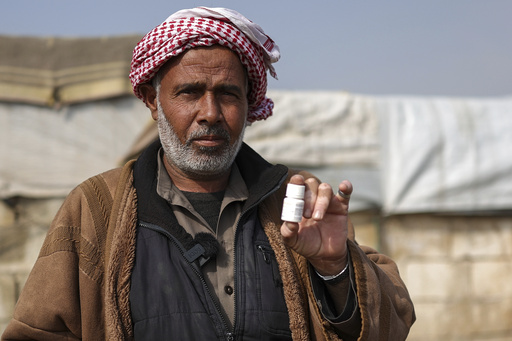
SARMADA, Syria — In Sarmada, northern Syria, Dr. Mohammad Fares finds himself opening the doors to a clinic that was once filled with patients. Today, however, the clinic is nearly empty, with the shelves stocked only with a few boxes of bandages and outdated medicines.
The situation arose following the Trump administration’s decision to stop U.S. foreign assistance last month. The U.S. Agency for International Development (USAID) issued stop-work orders while conducting a 90-day review, claiming the funding had led to excessive spending.
Dr. Fares worked in three clinics operated by Médecins du Monde, or Doctors of the World, providing free healthcare to the local displaced population in northern Syria, a region that had been a major rebel stronghold until the ousting of former President Bashar Assad in December. This area became a refuge for millions escaping the prolonged civil conflict.
The arrival of a powerful 7.8 magnitude earthquake in early 2023 further exacerbated the plight of the displaced, causing an influx of people into already strained camps. While some displaced individuals began to return to their homes after the fall of Assad, many found that their homes no longer existed.
Dr. Fares’ clinic previously catered to 16 camps in the vicinity, serving around 35,000 people. However, with the aid halt, 10 clinics that relied on USAID funding ceased operations, leading Doctors of the World to lay off 184 staff members. Dr. Fares expressed concern, stating, “Without a resumption of support, vulnerable groups will face significant risks. The operational costs of clinics are notably lower than those of hospitals, and closing them will only increase the burden on emergency hospitals and other healthcare services.”
In this region, where government healthcare is largely absent, residents depend on nonprofit organizations, making the repercussions of the U.S. funding cuts even more severe, according to aid workers and specialists.
Ian Mitchell, a senior policy fellow at the Washington-based Center for Global Development, reported, “Our assessments indicate that a full withdrawal of USAID support from Syria equates to a catastrophic shock of 5% to an already struggling economy. This amount of impact is among the biggest for any aid recipient.” Despite the U.S. contributing merely 25 cents in foreign aid for every $100 of American income, this seemingly modest support has proved to be critical. “Without U.S. backing in regions like Gaza and Syria, global violence and instability will likely increase,” he added.
At a camp served by a Doctors of the World clinic near Kawkaba village, children were seen playing amidst tightly packed tents. Camp director Abdelkareem Khaled commented on the dire conditions caused by the cessation of aid. “Patients reliant on monthly medicine can no longer manage pharmacy costs,” he noted, leading patients with chronic conditions to make agonizing decisions.
Bassam Hussein, a father of four daughters, shared his struggles, saying he had to withdraw his 12-year-old daughter from school to work in an almond field to help pay for his thyroid medication. “Every twenty days, I need a pack of medicine that costs $12. If I can’t afford it, I suffer from complications like weakness and depression,” he explained, noting that he is unable to work due to past injuries.
Meanwhile, several organizations find themselves in a precarious situation. While some have managed to continue their services, they remain uncertain about their funding sources. Dr. Mufaddal Hamadeh, president of the Syrian American Medical Society, which operates hospitals and mobile clinics throughout northern Syria, highlighted that essential services like maternity wards and incubators must persist, but their sustainability is in doubt.
“We’re unsure if we’ll receive a waiver or reimbursement for current expenses,” Dr. Hamadeh remarked, addressing the U.S. government. This uncertainty has placed significant financial strain on their operations, although he refrained from elaborating further.
Secretary of State Marco Rubio has issued a waiver that permits emergency food aid and crucial programs to continue, but Dr. Hamadeh and others maintain that funding levels have not returned to where they would fully restore their services. “We may have to close certain hospitals and reduce our operations,” he stated. “Providing free services is no longer feasible.”
Some initiatives, such as mental health support for refugees and an autism center for children, may not qualify as life-saving and could be at risk of closure. Dr. Hamadeh noted, “We have a grant that aids survivors of torture and sexual assault. Are these services deemed life-saving? It seems likely they will be discontinued.”
Questions directed toward USAID and the U.S. government remain unanswered. Despite waivers, funding has yet to recommence, and USAID personnel who would typically facilitate these processes have reportedly disappeared.
The Syrian American Medical Society relies on USAID for about 25-30% of its funding, which although significant, pales in comparison to other organizations in Syria that depend on USAID more heavily. For instance, Doctors of the World’s Istanbul office, which oversees operations in northern Syria, derived 60% of its funding from USAID.
Reflecting on the abrupt halt of assistance, Turkish branch director Hakan Bilgin recounted the unexpected delivery of stop-work orders: “We were taken by surprise. As a medical organization offering essential services, you’re effectively saying: Cease all operations and stop providing care for women, children, and the elderly.”
Consequently, Bilgin reported that daily consultations across northern Syria have plummeted from 5,000 to just 500. The organization has sought a waiver from the U.S. but has yet to receive a response.
Recent cuts to aid have been viewed as short-sighted actions that could damage Washington’s global standing. Dr. Hamadeh emphasized the impact of such funding on saving lives, stating, “This money is vital for people in need. You can’t simply eliminate USAID, which has positively affected millions globally and bolstered America’s image.”
The prolonged conflict and neglect in northwest Syria have created a desperate situation, and pulling the support at this juncture risks intensifying suffering across the region.

